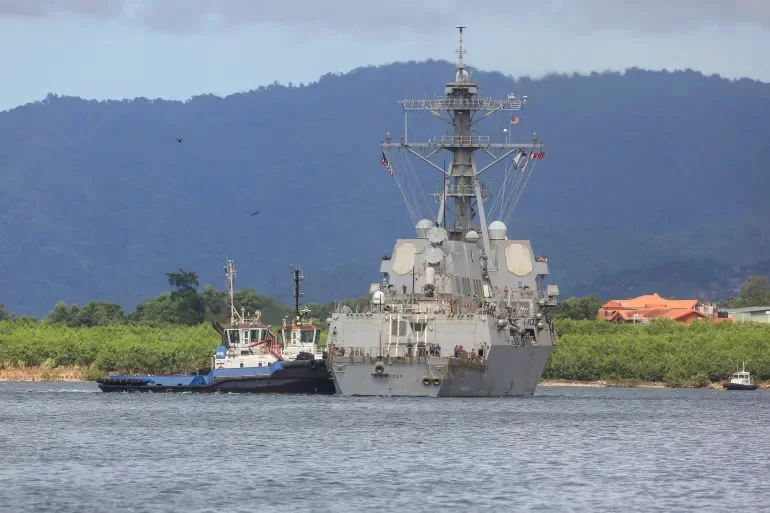Venezuela has declared Trinidad and Tobago’s Prime Minister, Kamla Persad-Bissessar, persona non grata, escalating tensions between the neighboring nations over the presence of U.S. military forces in the Caribbean. The Venezuelan National Assembly approved the sanction on Tuesday, officially barring Persad-Bissessar from entering the country. In response, the Prime Minister dismissed the move, stating, ‘Why would they think I’d want to go to Venezuela?’ in an interview with AFP.
The two countries, separated by a narrow 11-kilometer bay, have seen relations deteriorate due to recent U.S. military activities in the region. Persad-Bissessar is one of the few Caribbean leaders openly supporting the U.S. military buildup and its strikes on alleged drug trafficking vessels. Following the first missile strike on September 2, she remarked, ‘Like most people in my country, I’m glad the U.S. Navy is successful in its mission. I have no sympathy for drug traffickers; the U.S. military should kill them all, violently.’
This stance has clashed with Venezuela’s government, which condemned the U.S. actions as ‘illegal and utterly immoral military threats’ during the United Nations General Assembly. Legal experts warn of potential violations of international law, comparing the strikes to extrajudicial executions. To date, at least 13 attacks have targeted 14 vessels, primarily small boats, resulting in an estimated 57 deaths. The identities and involvement of those killed in drug trafficking remain unconfirmed.
The declaration of Persad-Bissessar as persona non grata marks the latest escalation in bilateral tensions. Reports suggest Trinidad and Tobago is considering mass deportations of undocumented migrants, many of whom are Venezuelan. This follows Venezuelan President Nicolás Maduro’s suspension of a key gas agreement with Trinidad and Tobago, citing the island’s reception of a U.S. warship as a provocation.
Maduro accused Persad-Bissessar of transforming her country into ‘an aircraft carrier for the American empire against Venezuela.’ The Pentagon has stationed seven warships, a submarine, drones, and fighter jets in the Caribbean, with an additional warship in the Gulf of Mexico. The intensity of U.S. strikes has increased recently, with six attacks occurring in just one week, extending to the Eastern Pacific near Colombia and Caribbean waters off Venezuela.
Analysts view these military actions as part of the Trump administration’s efforts to pressure and destabilize Maduro, who was re-elected in 2023 in a vote the U.S. labeled fraudulent. Despite international criticism, Persad-Bissessar continues to support the U.S. actions, emphasizing her preference for drug traffickers to be ‘blown to pieces’ rather than inflict violence in her own country.
